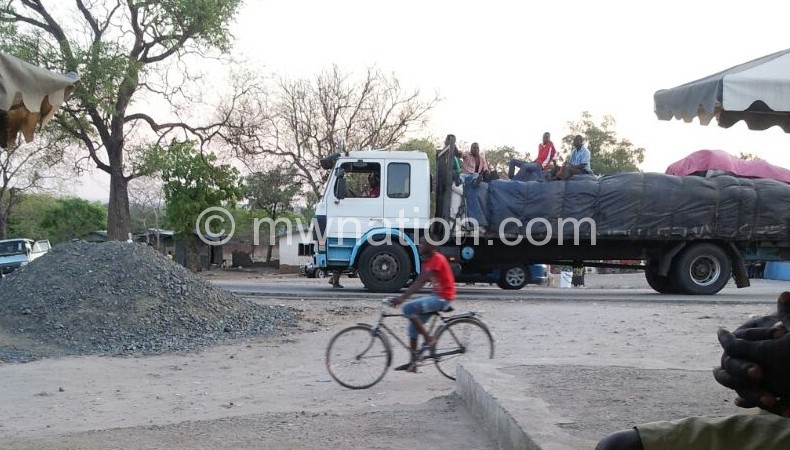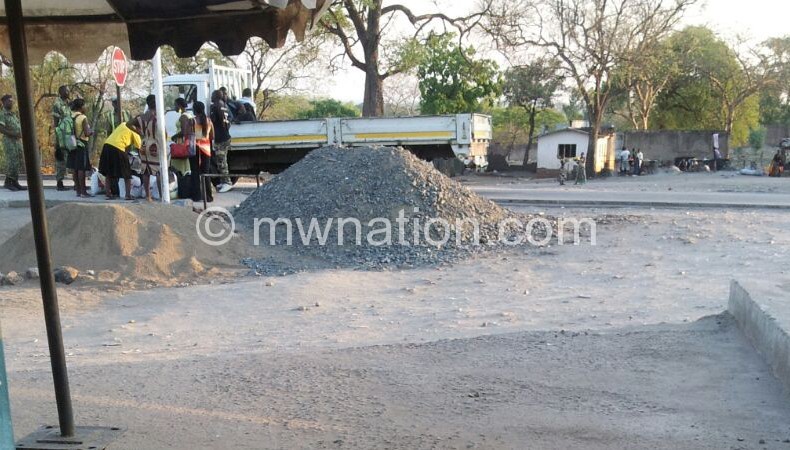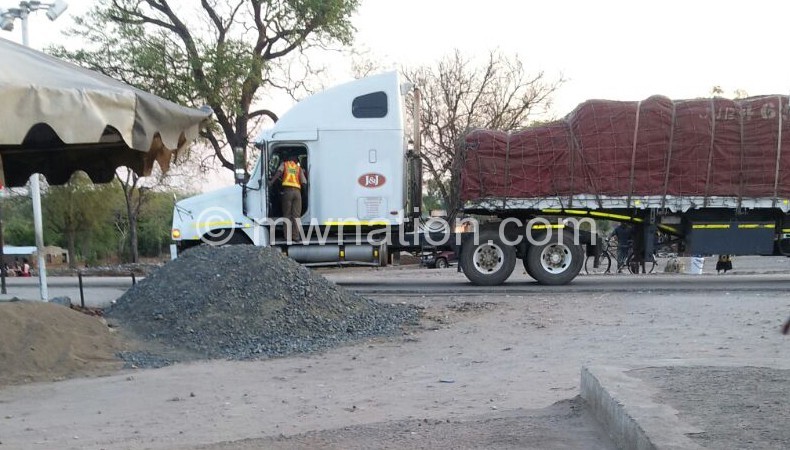Fishy business at Zalewa
If roadblocks are meant to curb crime by, among other things, ensuring that illegal cargo does not easily slip through, then the situation at Zalewa Roadblock near Shire River on the Blantyre-Lilongwe M1 Road is defeating the purpose.
On Saturday, The Nation camped at the roadblock for about four hours (from 4.12pm to 8.10pm) and monitored the goings-on.

During the mission, which followed on concerns by some members of the travelling public that there is laxity as well as suspicions of bribery by police and forestry officers, The Nation crew witnessed how buses as well as trucks beat the system through a mere “hand-shake” between drivers and the officers.
Previously, or traditionally, when buses, including luxury coaches, got to Zalewa Roadblock, they would pullover to a designated space where police officers conducted checks before releasing them.
However, on several days, including on Saturday, buses have been seen passing through without any checks, prompting some concerned citizens to wonder whether the rules have changed and indeed if roadblocks such as the one at Zalewa are still necessary.
During the mission, our team first saw a minibus registration BQ 4599 at 16:24hrs, travelling from Blantyre direction, freely drive past the roadblock. It stopped some metres after the barrier, but started off without any check.
In the subsequent three hours, 19 minibuses, 14 trucks, nine big buses and more than 70 other motor vehicles were counted crossing the roadblock.
However, of the nine buses only three had their passengers disembark for police check while in the case of minibuses, this was done to seven. The rest crossed the barrier unattended.

Among the unchecked buses were Axa Executive Coach registration MN 601, which crossed at 17:20hrs enroute to Lilongwe; National Bus Company double-deck coach registration BR 9191 (18:50hrs), Premier Bus Service (PBS) coach and other buses with registrations NA 2945, NA 4428 and NA 3601 as well as Intercape cross-border coach registration ICG 339 GP from Johannesburg, South Africa to Blantyre.
Matours, registration BR 4996, was the only bus to be thoroughly checked. It stopped at the roadblock for 16 minutes and had its passengers asked to disembark.
We also counted 33 charcoal bags (carried on top of trucks) freely crossing the roadblock in full view of the officers and forestry assistants.
Unverified statistics collected at the roadblock indicated that more than 800 motorists cross the point every day. This, on average, translates into about 30 vehicles crossing the roadblock per hour.

Some traders at the roadblock told The Nation that the police officers are mostly seen checking the buses when their officer-in-charge, Bravo Chipelesa, is present.
When contacted on Monday, Chipelesa said: “I can’t explain why or say yes or no that during the time you were here several buses and minibuses were just crossing without being searched. But let me say I am shocked to learn about that and I will do an investigation and expect some changes soon.”
At the time of our investigations, there were more than six officers on duty—two traffic police officers, two armed Police Mobile Service officers and other general duties officers. Some of them were even seen helping people to jump on to trucks as matola (unauthorised passengers).
Some vendors alleged that there were open and high-level bribes taking place at the roadblock.
“They [police officers] have turned it [the roadblock] into a business venture. They are actually doing it openly these days. They only conduct real checks on buses when their officer-in-charge is present. But the moment he leaves, very little happens.
“As traders, we are furious with it because our proceeds have dropped since passengers no longer disembark from the buses and buy from us. Imagine previously, I used to make a minimum of K25 000 every day, but now it has gone down to as little as K10 000, it is worrisome,” complained one fast-food vendor who refused to be identified for fear of reprisals.
One bus driver at Wenela Bus Depot in Blantyre claimed that on average most drivers buy freedom of the routes with K1 000 bribes unless “you have a serious offence.”
Said the driver: “It is a tactic we do to save us over the long haul because the cops remember us and don’t pester us every time we meet them. That is why we mostly just cross without being checked.”






Close the roadblock, and put up a roving team of inspectors that will put instant roadblocks anywhere in the vicinity. The idea is not to search every bus, minibus, or truck but to do a sampling analysis. That is more effective because no one knows which one will be searched.
Obviously checking each and every car, bus, truck that passes at the road block is out of question. It would also make sense if the story explained what the Police (Act) say about road blocks check! May be we are expecting too much from the cops. For the bribery I think it is in order if you consider Mphwiyo & Lutepo who chewed and are chewing our TAXES!
Its good to do random checks as they catch people unawares. So the Police are not lax but am sure its a trick to give confidence to unscrupulous people who would feel comfortable and only wake up when one day they find the police are very active. let the police do their work, they know better.